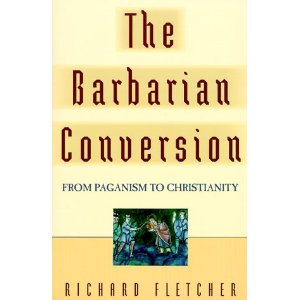
If you remember the discussion that was taking place about conversion, the blogs for October 3, 4, and 5, you will remember the question raised about people who said they “made” someone Christian – what did they actually do?
Did these people convert out of submission to a higher authority or because of a deep conviction of the heart, and if it was the former what does that say about us? There were pious and deeply faithful people in the church after the first centuries of Christianity, but we are talking about a church that was beginning to loose it’s first love and become an “institution” that had commercial and political viability. Generations of people were Christians because as my little cousin used to say, “they were borned that way”. How many of our brothers and sisters are Christian by birth only and does it make any difference? Had I not been raised by Christian parents and baptized at an early age would I have come to faith? More germane to our discussion, would anyone have brought the faith to me? If my name were Bernie Ogonganyo and I was black and from East Africa living in America, would anyone from the Smallenburger Church downtown have told me about Jesus?
We begin to ask the question more as we see the disappearance of the young and the low commitment level of the generations following the baby boom. Go to any of our larger churches and notice the empty pews on a Sunday morning. There are churches that at one time seated 300 people that worship 150 in two services. There are churches that had parochial schools that have had to close them because they reached a point where there were more teachers than students. Part of the reason is that the younger generations do not seem to have the same commitment as their parents and grandparents did. We face the double problem of declining numbers and an ageing population in many of our churches. We have never shaken off the “Christendom Model” which focused on building churches for the faithful and now the faithful are dead or declining but we still have the plants and the equipment to pay for and repair. Compounding these problems is the very real (in many cases) situation observed by Kurt Marquardt years ago, that we have catechized our people to “be the 4000 sitting down to be served rather than the harried 12 seeking to multiply and give away the blessings of Christ”.
Hence the question – “Who is It (the Gospel) for? Or we could ask who is the church for and why? What is the task of the church? Is it to cater to the faithful? Is it to evangelize the world? Is it both and more? Perhaps what I am really getting at is a more fundamental question even than that. Have the generations of Lutherans that rose up after World War 2 witnessed to the newer generations in a way that evangelized or converted them? This has the potential for being a really difficult question because it involves the Holy Spirit. It also involves our action and activity.
President Harrison engaged the question with this –
Today the fundamental gift and task of the Lutheran Church is to bear witness to Jesus Christ – to His Gospel and all its facets. This is our task toward each other. This is our task over and against those who do not know Jesus. This is also the sacred vocation and ecumenical task ofthe Missouri Synod to world Christianity. We exist to bear witness – even to the point of suffering and death – to salvation by grace alone, through faith alone, on account of Christ alone. – Matthew Harrison, Lutheran Witness, October 2010



This is a thought provoking article, Pastor. I am also wondering, if I am not born as “Jesupatham”, who would have told me the Gospel? If LC-MS missionaries have not come to India, how my grand mother, a poor widow with three kids accepted the faith of our Lord? The Church not only should cater the faithful and evangelize the world,it should bear witness and show mercy in action. The true Lutheran should evangelize at the least his family. My conscience is kindled.
Good work Pastor! Keep going!
Thanks this is a tough question to get a handle on but I am getting ideas as I go around talking to folks that I hope to address when I get the ground work laid. Getting good comments on line.